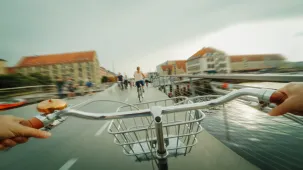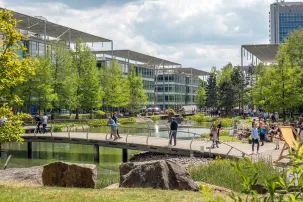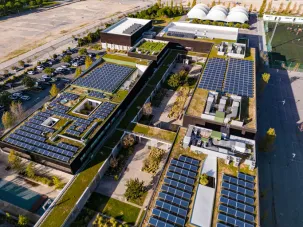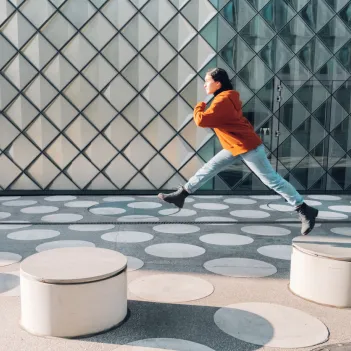About DUT Call 2024
In September 2024, the Driving Urban Transitions (DUT) Partnership launched its third call, co-funded by the European Commission (EC) under the Horizon Europe framework programme.
The purpose of this call is to support transnational research and/or innovation projects addressing urban challenges to help cities in their transition towards a more sustainable economy and functioning. The challenges are grouped into three themes, the Transition Pathways: 15-minute City, Circular Urban Economies and Positive Energy Districts.
On a global level, DUT Call 2024 is part of the Mission Innovation (MI) call series, i.e., MICall24. As such, call topics are prepared in collaboration with the Urban Transitions Mission (UTM) under MI, and all topics of the call are open for applications that directly and/or indirectly contribute to the work of UTM. JPI Urban Europe, a co-lead of the UTM, is contributing to UTM activities through its current R&I programme, the DUT Partnership, including the PED sprint implementation. In addition, the DUT Call 2024 will also be implemented in cooperation with selected Members of the Belmont Forum, which participates in the sall as individual funding agencies and thus enable further international partners to join DUT projects.
Latest updates
- Nov 2024
The first stage of the DUT Call 2024 closed. More than 2200 project partners applied for approximately €275 million in funding in 254 proposals. - Apr 2025
110 proposals were invited to the second stage. - Jul 2025
47 proposals were suggested for funding. - Oct 2025
46 proposals remain after one project withdrawal.
General Information

The 15-minute City Transition Pathway (15mC TP) addresses challenges of urban mobility, logistics, public space and proximity-based policies to promote implementation of climate neutral, resilient neighbourhoods for all. It draws on research and innovation projects to showcase a diverse mosaic of approaches that drive mobility transitions. The 15mC TP aims to enable analysis, development and testing of ideas, tools and innovations for 15-minute cities within co-creative and transdisciplinary settings.
15mC call topics

The Circular Urban Economies Transition Pathway (CUE TP) aims to foster urban places, communities and neighbourhoods that are sustained by circular resource flows and enhance the wellbeing of their inhabitants and ecosystems. It encourages urban planning and design characterised by regenerative urbanism, favouring the combination of circular principles, urban greening, and equal access to urban spaces and resources.

The Positive Energy Districts Transition Pathway (PED TP) aims to develop innovative solutions for planning, large-scale implementation, and replication of PEDs across Europe’s urban and peri-urban areas. By combining energy efficiency, renewable energy production, and energy flexibility at the local level, PEDs offer and contribute to affordable energy systems, affordable quality housing, and competitive, resilient and inclusive local economies for cities through energy communities, contributing to European goals such as the SET Plan and the EU Mission on Climate-neutral and Smart Cities.
Current status of the call process
- 2 Sep 2024 Stage 1 opens for pre-proposal submission
- 14 Nov 2024 Stage 1 closes
- Feb 2025 Stage 2 opens for full proposal submission
- 24 Apr 2025 Stage 2 closes
- Jul 2025 Funding decision announced
- End 2025 / beginning 2026 Projects start
- Sep 2026 Projects kick-off event
Participating countries
Austria, Belgium, Brazil, Bulgaria, Czech Republic, Denmark, Estonia, Finland, France, Germany, Greece, Hungary, Italy, Japan, Korea, Republic of, Latvia, Lithuania, Norway, Poland, Portugal, Romania, Slovenia, Spain, Sweden, Switzerland, The Netherlands, Taiwan (Chinese Taipei), Türkiye, United Kingdom.
